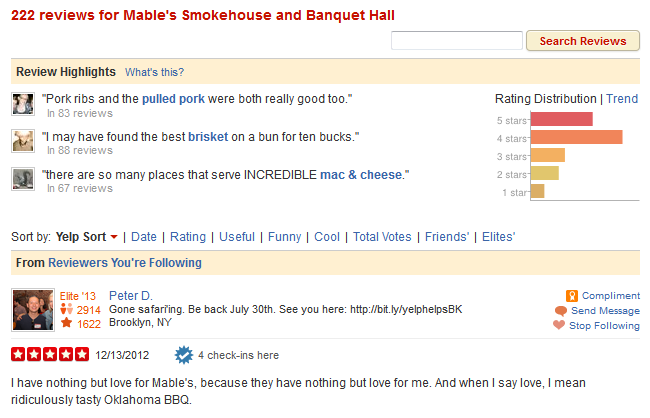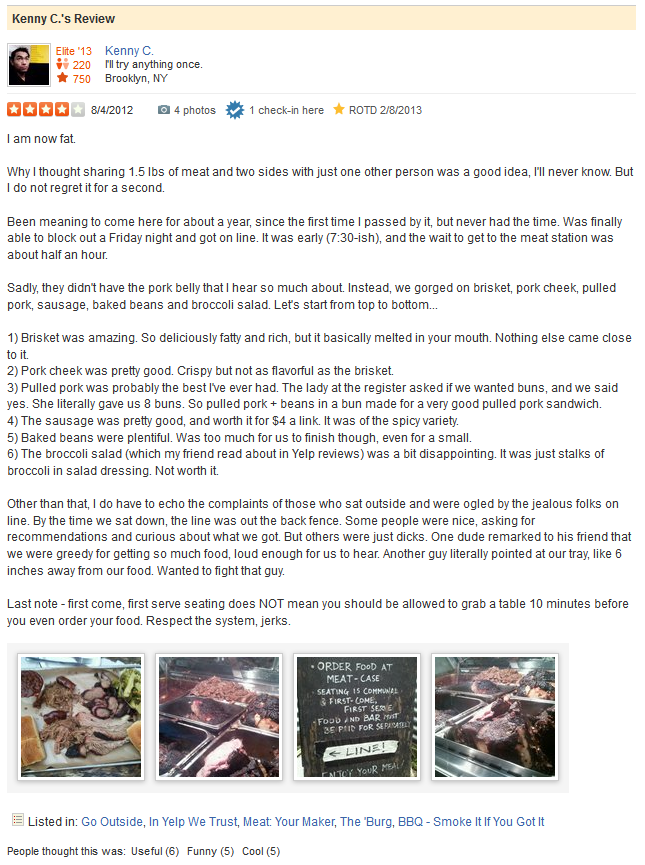Yelp seems to polarize most mixed company. There are some who are part of the “Elite” (myself included) who think of Yelp as a social club with private events and great food. There are business owners who love their high Yelp ratings for providing incremental business and digital word-of-mouth. There are also the owners who claim Yelp extorts them for positive rankings. And then there’s the casual user.
Most of the casual Yelp users I speak to fall into one of two camps – they either trust the wisdom of aggregated reviews, or they think the opinions of strangers are largely useless. Well, as the title of this post states, both of those groups are using Yelp wrong. Here are a few simple tips to improve your Yelping experience:
1) Create an Account!
The first mistake casual users make is not creating an account. There are many benefits to having an account other than being able to draft reviews. An account allows you to bookmark restaurants/other establishments, and allows you to check into places and receive deals (like Foursquare). There’s much more, and I could go on and on about these features, but the most important advantage of having an account (in my opinion) is the ability to friend and follow other users.
2) Find People Who You Trust!
If you use Yelp a lot, you inevitably start seeing the same faces over and over. For instance, if you’re often perusing restaurant reviews in Downtown Brooklyn, you’ll likely see Peter D’s profile pop up quite a bit. After reading a few of his reviews, you realize that you like his writing style and that you go to the same types of places that he does. So you send him a friend request. What this does is bring your friends’ reviews to the top of business pages, no matter how recent or favorable. If you’re shy, you can also become a fan of someone; this means they won’t know who you are, but their reviews will still come up first when you’re logged in. Think of it like Google’s personal search results.

This is how reviews of people you’re friends with or following show up at the top of Yelp pages. Above is Peter D, Brooklyn’s Community Manager and all-around good guy.
3) Engage With Other Users!
Lastly, one of the major quality control components of Yelp are the compliments and comments. If you like someone’s work, you can say so on their profile; this gives authority to reviewers. And if you like a specific review, you can give it a “Funny,” “Useful,” and/or “Cool” vote (what Yelpers affectionately refer to as FUC-ing reviews); this gives credibility to individual reviews. In fact, this is how the Review of the Day is calculated (I have a few under my belt).

My ROTD for Fette Sau. You can see how many times it’s been FUC’d at the bottom of the review.
Last, but not least, you can actually meet people at events or connect with existing friends on Yelp. It is, by all definitions, actually a social network. If you start treating it as such, then you’ll find that it’s a much more useful tool in your planning decisions.
4) Be My Friend!
By the way, if you need a recommendation of who to follow in New York, here’s my Yelp profile!


